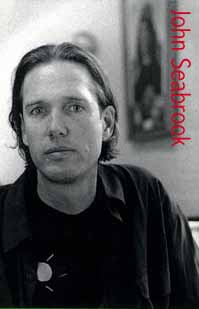| Deeper grew out of two articles John Seabrook wrote for The New Yorker magazine. The premise of the book is both simple and effective: the “newbie” is sent on a passage to cyberspace, armed only with rudimentary vocabulary and a tube of factor 30 to protect against “flaming”. The voyager then records his progress and, shazam, cyber-travel writing is born.
Travel incurs comparison between us and them, one way of living is pitted against another and whatever form it takes, travel of the mind always has the same destination: Utopia. Seabrook knows the drill and he”s feeling philosophical about it: “When you start out on-line, it seems as though politics, ethics, and metaphysics – all the great disciplines of mankind – are reduced to their original elements, and are yours to remake again.” It”s a telling statement. That weighty parenthesis about “the great disciplines” buys wholesale into an Enlightenment language of Progress but is tempered with the middling political correctness of “mankind”. An earlier age would have gone for “Man” with a capital aitch. Deeper, as a whole, makes a similar swoop from the loftiest liberalism into a gulf of neither-one-thing-nor-the-other. Perhaps Seabrook views this fall from idealism as tragic. I would agree, but find it nothing to boast about. The key word, in this statement of intent, is “yours”, for there is both something possessive about Seabrook’s view of Utopia, and something individualistic.
|
|
|
|
|
| Deeper is obsessed with metaphor. The structure breaks down into East and West, shaping the book like a metaphorical map of America. It draws, in particular, on the Old West of the pioneers, likening the cybernaut with Ole Rusty on his nag. The future, this suggests, has already been written, looping back into the past. There can be no new paradigms, they will always be programmed by the old. “It appears that, at least in this instance, God does appear to make to make the world restless, to move and revolve in all its parts, only to come to the same place again, just as Jonathan Edwards feared.” For Joyce, history was a nightmare he sought to escape. Seabrook just dozes through it and one century is as good as another. This explains his pessimism. A loop denies Progress, thereby denying Utopia. Endeavour is shackled to the wheel of fortune, always on the downturn.
|
|
|
|
| These are not stylistic gripes. We’re talking about Utopia here, itself a metaphor representing our social aspirations and a shorthand for our politics. The inappropriateness of Seabrook’s mythologising is doubly misplaced in its political resonance. To mourn the lost idealism of the Old West is churlish considering it massacred a native Eden to make way for its own. Seabrook”s country was established around issues of race, whether Native or African, yet parallels with the America of 1996 never move any deeper than lip service. He even has the temerity to quote Snoop Doggy Dogg: “I was seeing in my mind’s eye the gestures that Snoop makes with his hands in his videos, menacing and contrite at the same time. Stylishly murderous – that was what I wanted to be in this thread. But I was still too timid a dog to post.” Cool, white boy, very cool.
|
|
|
|
| Seabrook’s current dystopia is one of privilege under fire, where my standard of living threatens to be drowned in a flood of other’s demands. Utopia would be by invitation only. It is covertly a bullying force. Whilst Seabrook would claim to be a network man, he seeks an artificial state of “common consensus”, where the voice of one dominant group smothers all traces of dissent, a state of living where alternatives are unthinkable. In this model world other opinions are trouble-making or just plain wrong. “Common consensus” takes the guise of the rational, whilst it is anything but. Deeper assumes a politics: “Why should it not be the case, when the age, sex, and race of one’s correspondents do not come through the wires unless they choose to reveal such information, that the medium will help rid the world of ageism, sexism, and racism?” It then fails to make any real engagement at all. It merely poses as responsible: “But in fact it turns out that these and other prejudices are so deeply ingrained in humanity that even when egalitarianism is forced on users by the technical limitations of a medium, people find a way to be just as cliquish and exclusionary as they ever were.”
|
|
 |
|
| The arrogance is that not only does Seabrook include us all in his pronouncements but that this statement itself is quite untouched by methods of reason. “I have learned to back away from on-line fights, and to make overstated displays of submissiveness in front of the would-be alpha pern, and I have even started using smileys – :) – and grin signs in my postings, which I never thought I would do. I try to talk about what”s going on inside the thread. It”s a relatively easy way of adding “content” to the thread but at the same time of staying out of trouble. This is perhaps a little bleak, given the utopian fantasies I once cherished for this medium… .” He seems almost proud. Seabrook’s Utopia seems contingent on laziness. He won’t work for the revolution, he wants it on-line and ready to go. Installed, like software.
|
|



